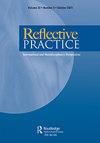How, why and why not – the reflective practice of teaching staff at a Scottish university
IF 1.6
Q2 EDUCATION & EDUCATIONAL RESEARCH
引用次数: 0
Abstract
ABSTRACT This two-stage study was conducted to examine the awareness of policy and underlying pedagogy as well as the use of reflective practice by teaching staff (faculty) within a Scottish university. In the first stage, teaching staff completed a questionnaire; of these 14 then took part in stage two, semi-structured interviews. Interview transcripts were subject to thematic analysis and three main themes emerged: (1) The methods and processes of reflection (‘How’); (2) The personal and organisational drivers for employing reflective practices (‘Why’); and (3) The barriers to reflection (‘Why not’). Significant findings included the dominance of traditional (paper-based as opposed to computer mediated) reflective writing in teaching staff’s own reflection, and the importance of both formal and informal group reflection in methods and process. Reasons for reflection focused on the importance of both organisational drivers such as professional standards and awarding bodies, and personal drivers such as personal growth, identity, and psychological wellbeing. Barriers to reflection included both the concrete such as insufficient time and lack of opportunities to share resources, as well as the attitudinal and cultural. Possible ways of tacking these barriers also emerged. Implications for organisational and individual practice are discussed.苏格兰一所大学教师的反思性实践是如何进行的,为什么进行,为什么不进行
本研究分为两个阶段,旨在研究苏格兰一所大学的教学人员(教师)对政策和基础教学法的认识,以及对反思性实践的使用。第一阶段,教师完成问卷调查;其中14人参加了第二阶段的半结构化面试。对采访记录进行专题分析,出现了三个主要主题:(1)反思的方法和过程(“如何”);(2)采用反思实践的个人和组织驱动因素(“为什么”);(3)反思的障碍(“为什么不”)。重要的发现包括传统的反思性写作在教师自身反思中的主导地位(基于纸张而不是计算机媒介),以及正式和非正式的小组反思在方法和过程中的重要性。反思的原因集中在组织驱动因素(如专业标准和奖励机构)和个人驱动因素(如个人成长、身份和心理健康)的重要性上。反思的障碍既包括时间不足和缺乏分享资源的机会等具体障碍,也包括态度和文化障碍。解决这些障碍的可能方法也出现了。讨论了对组织和个人实践的影响。
本文章由计算机程序翻译,如有差异,请以英文原文为准。
求助全文
约1分钟内获得全文
求助全文

 求助内容:
求助内容: 应助结果提醒方式:
应助结果提醒方式:


